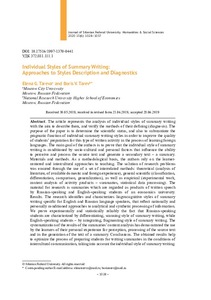Individual Styles of Summary Writing: Approaches to Styles Description and Diagnostics
Скачать файл:
URI (для ссылок/цитирований):
https://elib.sfu-kras.ru/handle/2311/111642Автор:
Tareva, Elena G.
Tarev, Boris V.
Тарева, Е. Г.
Тарев, Б. В.
Дата:
2019-06Журнал:
Журнал Сибирского федерального университета. Гуманитарные науки. Journal of Siberian Federal University. Humanities & Social Sciences;2020 13 (6)Аннотация:
The article represents the analysis of individual styles of summary writing with the aim to describe them, and verify the methods of their defining (diagnosis). The purpose of the paper is to determine the scientific status, and also to substantiate the pragmatic function of individual summary writing styles in order to improve the quality of students’ preparation for this type of written activity in the process of learning foreign languages. The main goal of the authors is to prove that the individual style of summary writing is conditioned by socio-cultural
and personal factors that influence the ability to perceive and process the source text and generate a secondary text — a summary. Materials and methods. As a methodological basis, the authors rely on the learner-centered
and intercultural approaches to teaching. The solution of research problems was ensured through the use of a set of interrelated methods: theoretical (analysis of literature, of available domestic and foreign experience), general scientific (classification, differentiation, comparison, generalization), as well as empirical (experimental work, content analysis of activity products — summaries, statistical data processing). The material for research is summaries which are regarded as products of written speech by Russian-speaking
and English-speaking
students of an economics university. Results. The research identifies and characterizes lingvocognitive styles of summary writing specific for English and Russian language speakers, that reflect nationally and personally conditioned approaches to analytical and synthetic processing of information. We prove experimentally and statistically reliably the fact that Russian-speaking
students are characterized by differentiating, scanning style of summary writing, while English-speaking
students — by integrating, fragmenting style of summary writing. The systematization of the results of the summaries’ content analysis has demonstrated the use by the learners of their personal experience for perception, processing of the source text and in the generation of the text of a summary. Conclusions. The obtained results help to optimize the process of preparing students for writing summaries in the conditions of intercultural communication, taking into account the individual style of summary writing Статья посвящена проблеме исследования индивидуальных стилей реферативной деятельности
человека с целью их описания, а также обоснования методов их выявления
(диагностики). Цель статьи — определить научный статус, а также обосновать прагматическую функцию индивидуальных стилей реферирования для повышения качества
подготовки студентов к данному виду письменной деятельности в условиях обучения иностранному языку. Основная установка авторов — доказать, что индивидуальный
стиль реферирования обусловлен социокультурными и личностными факторами,
влияющими на способность воспринимать и перерабатывать исходный текст и порождать вторичный текст — реферат. В качестве методологического основания
авторы опираются на личностно-деятельностный
и межкультурный подходы к обучению. Решение исследовательских задач обеспечивалось благодаря применению комплекса взаимосвязанных методов: теоретических (анализ литературы, обобщение
имеющегося отечественного и зарубежного опыта), общенаучных (классификация,
дифференциация, сравнение, сопоставление, обобщение), а также эмпирических (экспериментальная работа, контент-анализ
продуктов деятельности — рефератов, статистическая обработка данных). Материалом для исследования служат рефераты
как продукты естественной письменной речи русскоязычных и англоязычных студентов
экономического вуза. В результате выявлены и охарактеризованы лингвокогнитивные
стили реферирования носителей английского и русского языков, отражающие национально и личностно обусловленные способы аналитико-синтетической
переработки
информации. Экспериментально и статистически достоверно доказан факт проявления русскоязычными студентами дифференцирующего, сканирующего стиля реферирования, англоязычными — интегрирующего, фрагментирующего стиля реферирования.
Систематизация итогов контент-анализа
рефератов продемонстрировала использование студентами личностного опыта в восприятии, переработке исходного текста и в создании текста реферата. Полученные результаты способствуют оптимизации
процесса подготовки студентов к письменной реферативной деятельности, осуществляемой в условиях межкультурной коммуникации, с учетом проявления индивидуального
стиля реферирования
Коллекции:
Метаданные:
Показать полную информациюСвязанные материалы
Показаны похожие ресурсы по названию, автору или тематике.
-
The Influence of the Russian-Yakut Translation on the Development of Linguistic Research in the Yakut Language
Vasil’eva, Akulina A.; Васильева, А.А. (Сибирский федеральный университет. Siberian Federal University, 2018)The article is dedicated to the history of the Russian-Yakut translation in Yakutia which is inextricably linked with the history of the country and the political life of Yakutia, the history of the Yakut literary language, ... -
Style Moderne and the Rediscovery of the Wooden Architecture of the Russian North: the Photographic Connection
Brumfield, William C.; Брумфильд, У.К. (Сибирский федеральный университет. Siberian Federal University., 2016-10)The pre-Petrine “backwardness” of Russia’s wooden architecture would become a point of interest in the nineteenth century, as Russian intellectuals and artists began to search for origins, antecedents and authenticity ... -
От иностранного языка к переводу, или Via Scientiarum
Кононова, В.А.; Kononova, Valentina A. (Сибирский федеральный университет. Siberian Federal University., 2011-10)В статье рассматриваются некоторые аспекты преподавания перевода в университете в парадигме личностно ориентированного образования, а именно: роли преподавателя- переводчика и студента, переводческие стратегии. К обсуждению ... -
«Monoculture of the Mind» and Cultural Diversity in Knowledge Dissemination
Chernyavskaya, Valeria; Чернявская, В. (Сибирский федеральный университет. Siberian Federal University, 2017-02)The aim of the research is to look into specific linguistic principles of analyzing linguo-cultural identity in scientific communication. The author focuses here on cultural specificity of cognition: any cognitive activity ... -
Привлечение умов посредством поэзии
Кристофер, Н.М.; Christopher, Nkechi M. (Сибирский федеральный университет. Siberian Federal University., 2013-01)Успешное создание литературных произведений требует полного погружения в тематику, но иногда эту аксиому сложно применить по отношению к студентам. Тем не менее преподаватели порой обнаруживают, что их студенты могут даже ...

